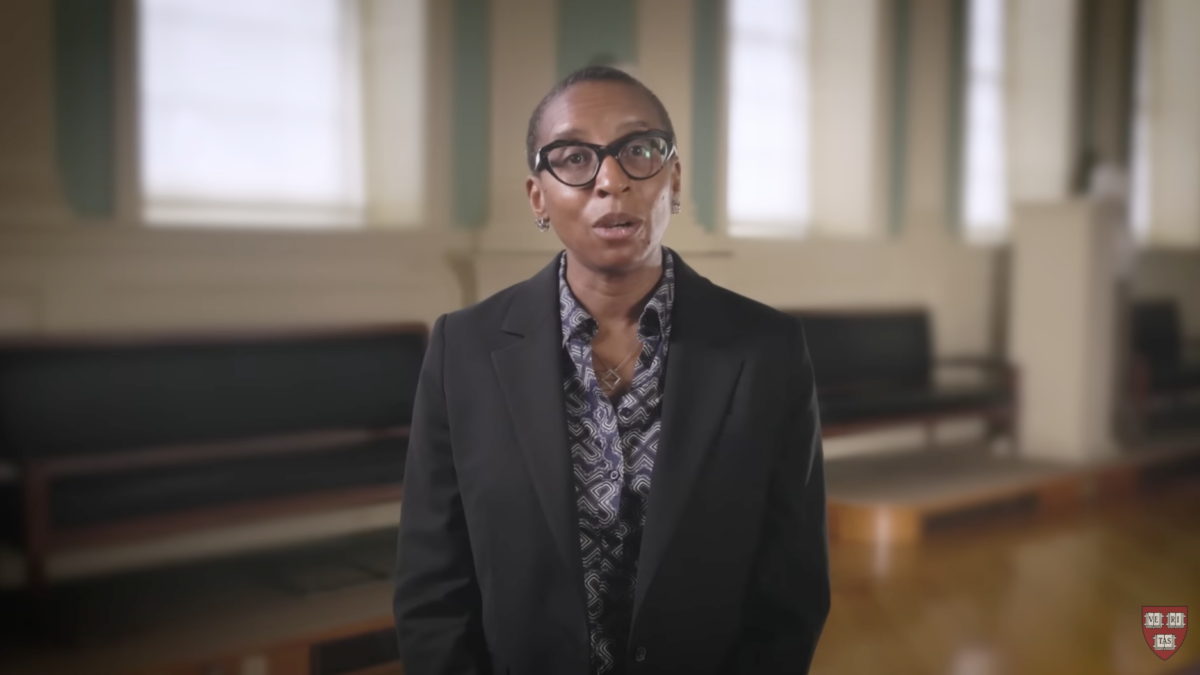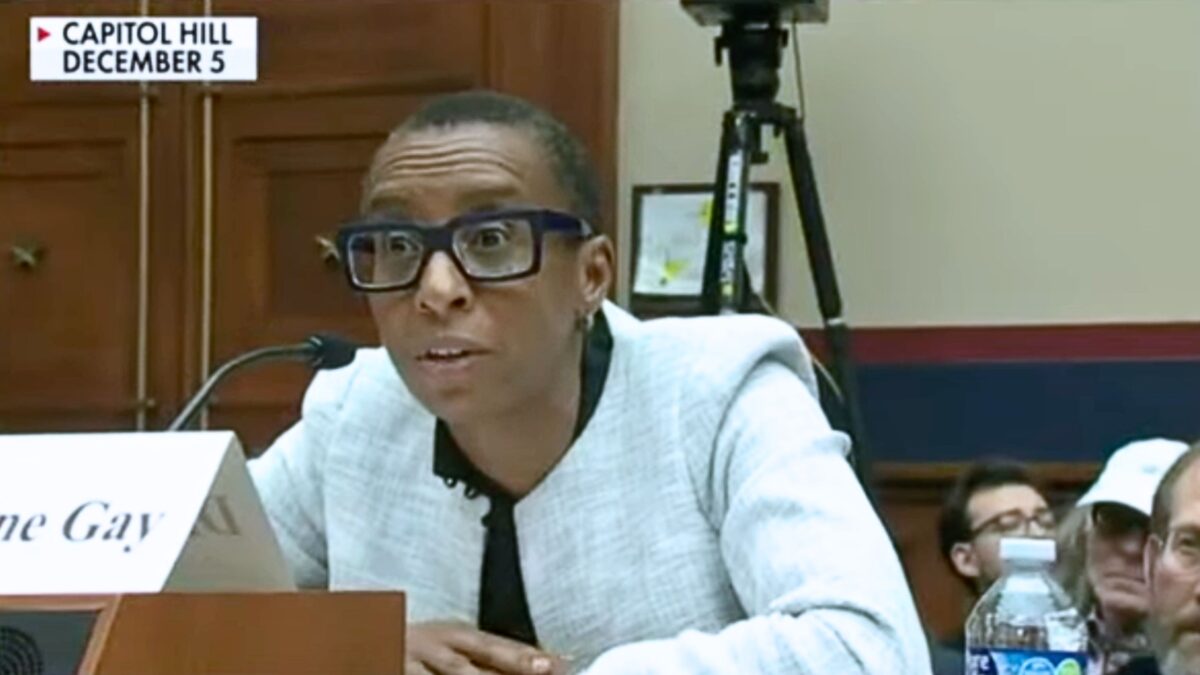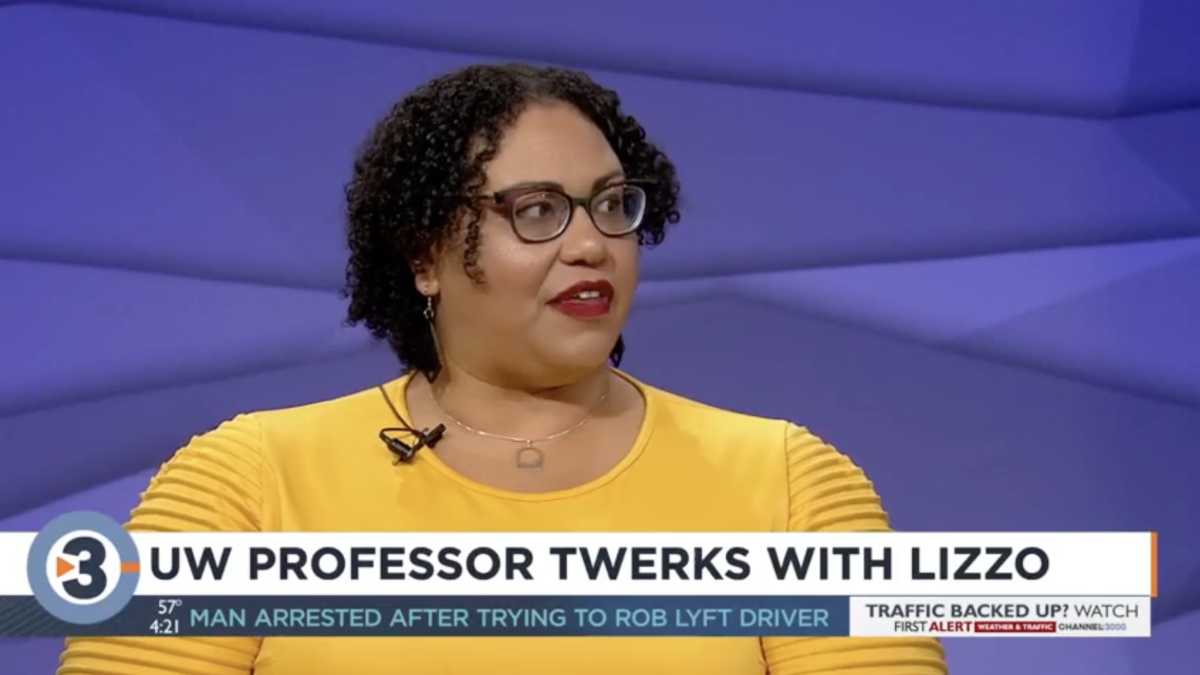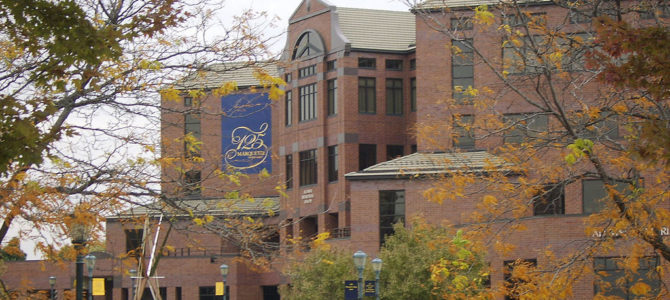
With the Wisconsin Supreme Court agreeing to hear Associate Professor John McAdams’ lawsuit against Marquette University sometime later this year, the Jesuit school’s “suspension” of the tenured conservative faculty member is back in the news. Earlier this month the Wall Street Journal recapped the facts underlying the case:
The sacked professor is John McAdams, who in 2014 wrote a blog post criticizing by name Cheryl Abbate, who taught a course in ethics. Ms. Abbate had told a student he could not express his disagreement with same-sex marriage in her ethics class because it was ‘homophobic’ and on that issue, there could be no debate. In his post on the incident, Mr. McAdams made no judgment on same-sex marriage. But he noted that liberals are inclined to deem views they disagree with as offensive and then use that to shut down debate. The story went national.
Marquette officials took action—against Mr. McAdams. He was blamed for the hate mail that Ms. Abbate received after he named her, even though there’s no evidence he was part of any of it. Marquette President Michael Lovell gave him an ultimatum: apologize or be suspended without pay indefinitely. Mr. McAdams refused to apologize and has been effectively fired.
McAdams took Marquette to court, but a trial court judge tossed his case last June. McAdams immediately appealed. While typically an intermediate court would review the case, given its importance, the Wisconsin Supreme Court agreed to hear McAdams’ appeal directly. This news brought renewed criticism over the tenured professor’s “suspension,” with the Wall Street Journal’s editorial board chastising Marquette and concluding: “How much better we’d all be if Marquette would acknowledge its mistake and give the professor his job back.”
Marquette President Michael R. Lovell defended McAdams’ “suspension” in a letter WSJ published a few days later. There, Lovell claimed McAdams’ “suspension” was justified because he “inflicted a public and personal internet attack on our student.” In this attempt to save face, Lovell quoted the Milwaukee County judge’s opinion that concluded “academic freedom does not mean that a faculty member can harass, threaten, intimidate, ridicule, or impose his or her views on students.”
Criticism of Marquette is justified, however, in the additional details buried in the court record. Here are ten such tidbits.
1. Marquette Promised Not to Fire Faculty Members for Speech
In his lawsuit, McAdams claims the Jesuit university breached the terms of his employment contract. In its contract with McAdams, Marquette guaranteed that it would not “impair the full and free enjoyment of [faculty members’] legitimate personal or academic freedom of thought, doctrine, discourse, association, advocacy or action.” Marquette also promised that “dismissal will not be used to restrain faculty members in their exercise of academic freedom or other rights guaranteed by the United States Constitution.”
As the Wall Street Journal editorial board put it: “No one forced Marquette to enter into an employment contract with Mr. McAdams. But it did. And that contract says he cannot be fired for exercising a right guaranteed by the U.S. Constitution. By any reasonable standard that would include the First Amendment—even at a Jesuit university.”
2. McAdams’ Blog Post Advocated Academic Freedom
Marquette guaranteed McAdams “full and free enjoyment” of academic freedom of thought, discourse, advocacy, and action, as well as freedom of speech by incorporating the rights guaranteed in the U.S. Constitution. McAdams’ blog post fell squarely within the scope of these contractual promises.
The entire blog post can be read here, but because a summary cannot suffice to show the absurdity of Marquette’s actions and the legitimacy of McAdams’ advocacy for the academic freedom of a student, extended screenshots are necessary:
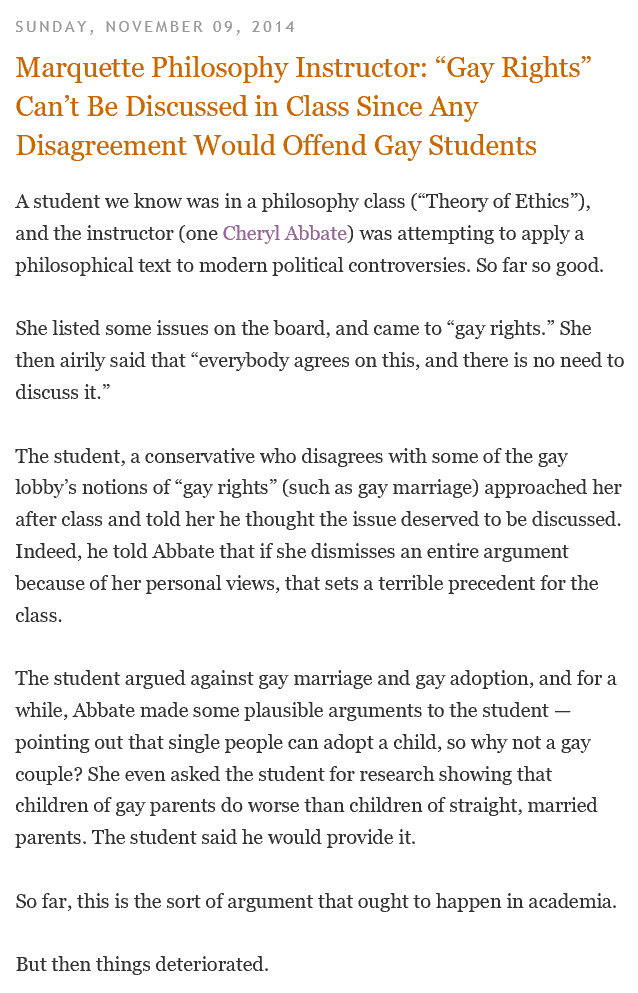
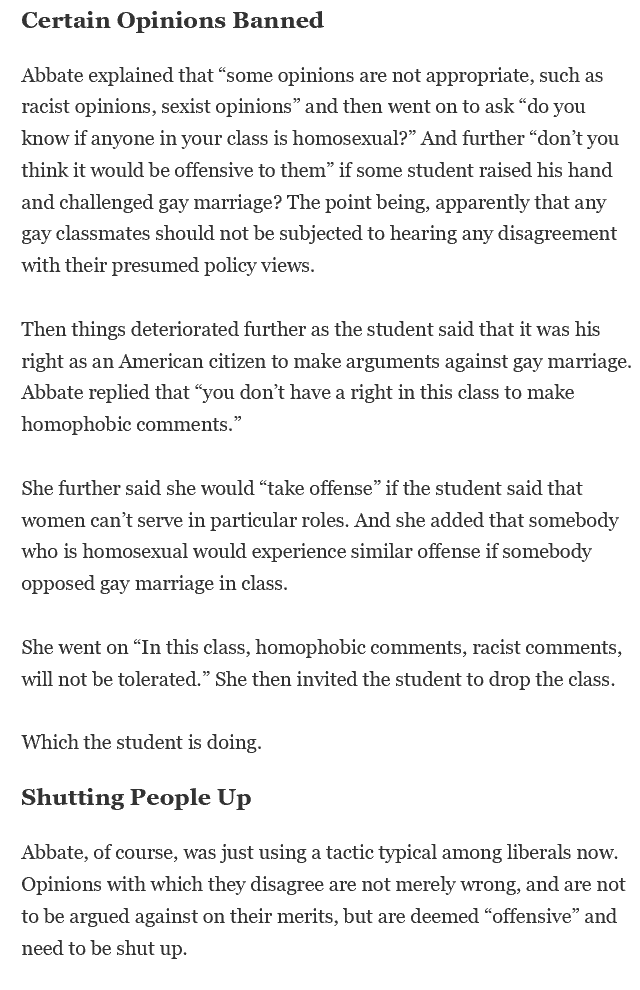
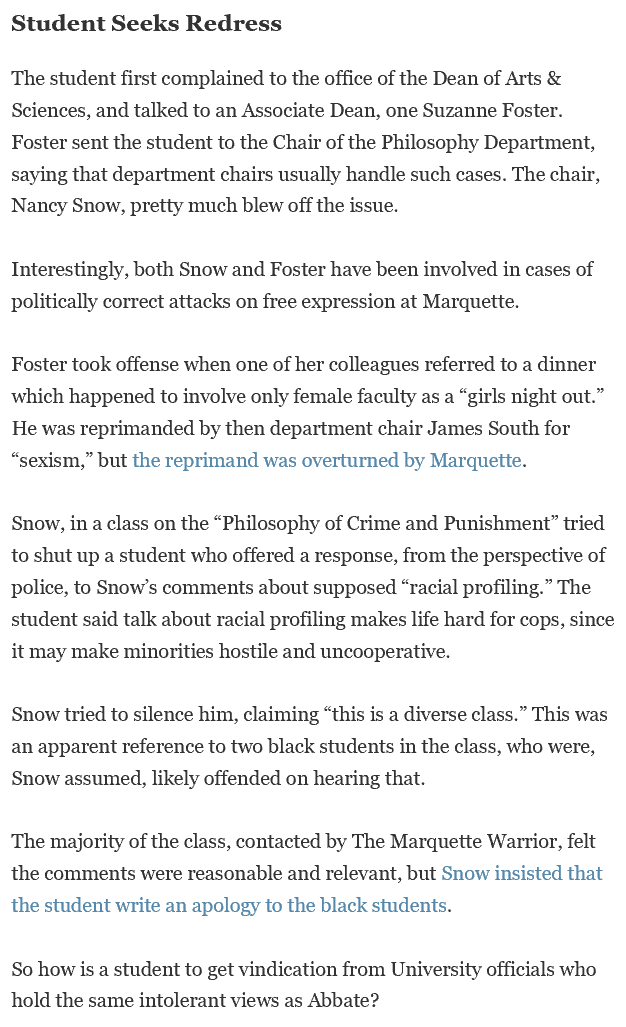

3. McAdams Did Not ‘Harass,’ ‘Attack,’ or ‘Shame’ Abbate
Marquette “suspended” McAdams because of the above-quoted blog post, which Marquette president Lovell characterized as “a personal, demeaning internet attack on a Marquette student.” In no sane world do these adjectives describe McAdams’ words! Read them again.
In fact, the morning after McAdams’ blog post, an associate dean wrote Abbate, the graduate student who in teaching a class had forbidden dissent on gay marriage: “[Y]ou come off well. That is, anyone who looks at the blog will see where sanity lies.” Abbate concurred: “When I saw the blog I was pleasantly surprised.”
4. There Was Name-Calling, But Not From McAdams
While Marquette paints McAdams as the harasser whose actions were “disturbing,” pretrial discovery revealed a different reality. A few days after the blog post, Abbate called McAdams a “bigoted moron,” an “uncritical, creepy homophobic person with bad argumentation skills,” “a flaming bigot, sexist and homophobic idiot,” and for good measure added he had an “ugly face.”
The chair of Marquette’s Philosophy Department also had some choice words, referring to McAdams in writing as a “right wing lunatic.” The chair also called the student who had complained about Abbate—identified in court proceedings only as JD—a “insulin [sic] little twerp,” a “little twit,” and a “jackass.”
5. McAdams Violated No University Rule by Blogging About the Incident
In justifying McAdams’ “suspension,” president Lovell complained that McAdams did not express “his concerns through established internal channels, [b]ut instead chose to blog about our graduate student….” But Marquette’s promise of “full and free enjoyment” of advocacy for academic freedom is not limited to “established internal channels.” Marquette also admitted there is no rule against faculty members identifying individuals or linking to their websites, as McAdams had.
Further, it is beyond cheeky for Lovell to complain that McAdams did not use “internal channels,” when he only blogged about the incident after the student attempted to do so for naught: JD complained about the incident to an associate dean, who directed him to raise the issue with the Philosophy Department. When JD later met with the chair and assistant chair of the Philosophy Department, rather than discussing Abbate’s silencing of his dissenting view, the administrators told JD “he needs to change his attitude, so he comes across as less insolent and disrespectful,” then later, presumably behind his back, engaged in the name-calling noted above.
After the meeting, Abbate thanked the chair, writing, “Hopefully this experience has informed him that oppressive discourse is not acceptable.” McAdams only went public with the story after internal channels failed—even though nothing prohibited him from doing so earlier and the contract expressly guarantees him the right to advocate for academic freedom.
6. It Is Disingenuous to Call Abbate a Student
Since the scandal first broke, Marquette has attempted to paint McAdams as a bully by characterizing Abbate as a mere student. Yes, she was a graduate student, but like many graduate students she also teaches at the university.
McAdams’ blog post focused on Abbate’s conduct solely as an instructor. He never once called her a student. And his criticism of Abbate focused on her behavior as an instructor—silencing the viewpoint of students in her class—a class Abbate was responsible for both teaching and grading and for which she was compensated.
Yet in his letter to the Wall Street Journal, Lovell calls Abbate “a graduate student[],” “our student,” “our graduate student,” “our student,” and “a Marquette student.” Not once did Lovell acknowledge the reality of Abbate’s role in the controversy: She was acting as a faculty member and in that role, the only student involved was JD—the conservative student whom Abbate silenced and McAdams defended.
7. Abbate Attempted to Get McAdams Fired
After McAdams’ blog post, Abbate went on a mission to get McAdams fired. She noted to a confidant that she couldn’t believe “this bigoted moron has a job at Marquette,” then within two days of the blog post, worked to see that he didn’t. She filed a complaint about McAdams’ blog post with the university, claiming she had “been the target of harassing emails, sent by [McAdams’] followers.”
However, as discovery would later reveal, at the time Abbate filed the complaint she had received only a single email, and that email was critical but not harassing. Abbate later demanded that the university fire McAdams, punish JD, pay her damages, and threatened that if Marquette did not agree to do so, she would have “recourse to a lawsuit.” On December 10, Abbate wrote president Lovell a second time, seeking “reparations,” and threatening to sue and “reach out to national, academic news sources again.”
8. Raising the Heckler’s Veto
Although at the time Abbate first filed a complaint against McAdams she had only received one critical email in response to the McAdams blog post, after the College Fix, Insider Higher Ed, and Fox News picked up the story she received a total of 135 emails or letters. Of these, 49 supported her and of the ones that criticized her, only 18 were truly harassing.
Yet Lovell attempts to justify McAdams’ “suspension” by positing that McAdams’ blog post “exposed [Abbate] to a flood of violent threats and hateful messages.” But McAdams had nothing to do with the email complaints Abbate received. They came about as Abbate and Marquette’s actions were publicized in unrelated outlets — and Abbate was the one who sought media attention.
Further, McAdams’ right to “full and free enjoyment” of academic freedom cannot be disregarded because third parties heckled Abbate. A heckler’s veto cannot overcome rights to free speech.
9. Abbate’s Transfer Wasn’t Over This Incident
Not only did Marquette defend its “suspension” of McAdams by stressing the conduct of unrelated third parties, it slanted the story from the beginning. When the university first advised McAdams that it was “commencing the process to revoke your tenure and to dismiss you from the faculty,” Dean Richard Holz blamed McAdams’s blog for causing Abbate to withdraw from the university’s “graduate program and move to another University to continue her academic career.”
Yes, Abbate withdrew from Marquette and moved to another university—the University of Colorado. But, as McAdams would only discover after suing Marquette, Abbate “had tried and failed to transfer to the more prestigious philosophy program” the prior year. Following the national attention garnered from McAdams’ post, Abbate “succeeded and was offered ‘significant financial aid.’” Transferring from Marquette, which according to one source ranks 97th for Ph.D. programs in philosophy, to Colorado’s 38th-ranked program, isn’t quite the harm the university paints.
10. Marquette’s Hearing Committee Was a Sham
President Lovell also continues to portray McAdams’ “suspension” as justified by relying on the Marquette Faculty Hearing Committee’s unanimous conclusion “in a 123-page report that Mr. McAdams violated his core obligations as a tenured professor when he used his blog needlessly and recklessly to harm our student.”
As already noted: (1) the blog post advocated for students’ academic freedom—something McAdams’ contract protects; (2) any harm came from third parties; (3) the “harm” ended up benefitting Abbate; and (4) Abbate’s role in the kerfuffle was as an instructor, not as a student.
But let’s consider that “Faculty Hearing Committee.” Its hearing took place in September 2015, but Marquette had “suspended McAdams from his teaching duties and banished him from campus” on December 16, 2014, declaring the university “will not stand for faculty members subjecting students to any form of abuse, putting them in harm’s way.” (Apparently, the “student” was Abbate and the “abuse” was McAdams’ blog post.)
The Faculty Hearing Committee seems nothing but a post-hoc rationalization for a predetermined outcome. In fact, one committee member, “Dr. Lynn Turner, signed an open letter critical of McAdams and supportive of Ms. Abbate prior to the [Faculty Hearing Committee meeting].”
The letter stated: ‘We support Ms. Abbate and deeply regret that she has experienced harassment and intimidation as a direct result of McAdams’s actions. McAdams’s actions—which have been reported in local and national media outlets—have harmed the personal reputation of a young scholar as well as the academic reputation of Marquette University. *** This is clearly in violation of . . . the Academic Freedom section of Marquette’s Faculty Handbook[.]’” McAdams asked that Turner be recused from the Faculty Hearing Committee, but that request was denied.
Marquette also withheld information from McAdams, such as Abbate’s demand for “reparations,” her threat to sue and cause more publicity, the supportive emails she received, and information about Abbate’s prior attempt to transfer to Colorado. McAdams only discovered this information after he was “suspended” and sued Marquette.
Likewise, the public is only first learning of the extent of Marquette’s outrageous disregard for its promise to safeguard the academic freedom of McAdams. With this added information, it seems clear now that someone does deserve an apology. It just isn’t Abbate. And someone does deserve to be fired. It just isn’t McAdams.
Disclosure: Cleveland is a graduate of Marquette University. She did not know McAdams while a student and only learned of him when reading of the controversy in 2014. She also does not know Abbate, although as a 17-year old Marquette University freshman in 1985, she had a philosophy instructor made in the same mold. She just lacked the maturity, mentor, and moral training (and fortitude) necessary at the time to confront the heresy taught as truth at this purportedly Catholic university.


